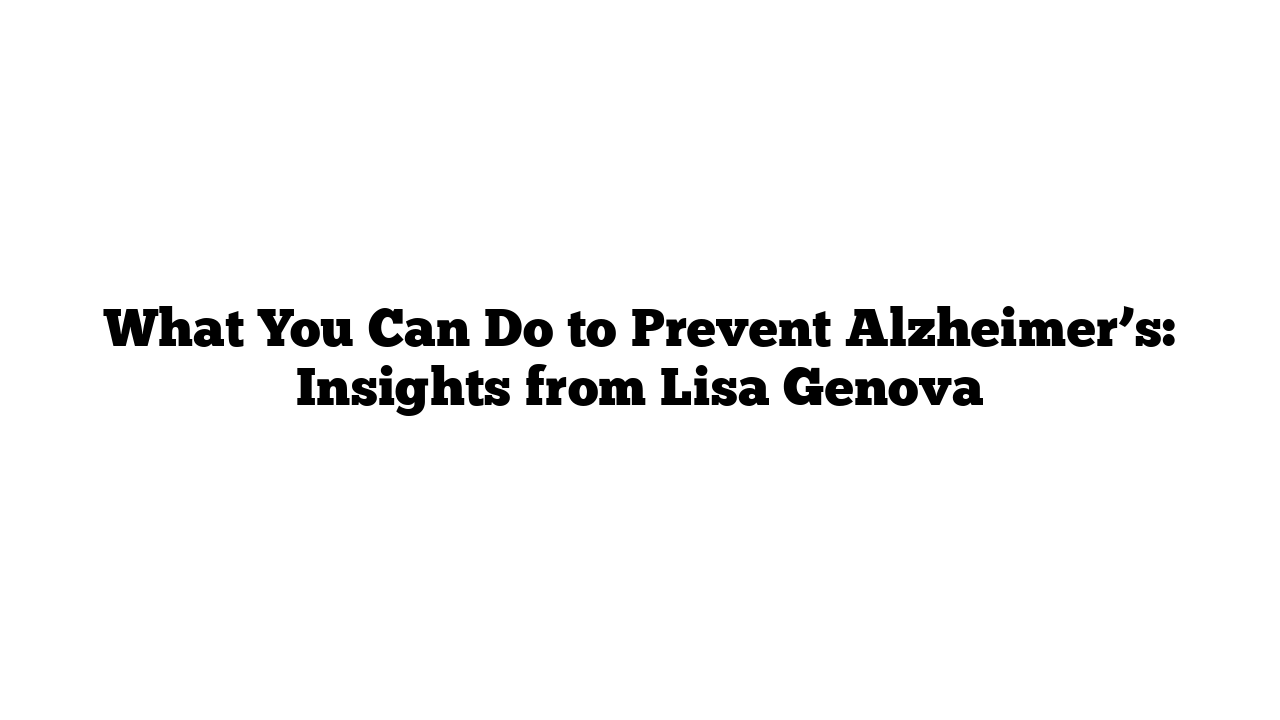Many of us hope to live to at least 80 years old, but with that expectation comes the reality of age-related diseases like Alzheimer’s. The thought of developing Alzheimer’s can be frightening, as it’s often perceived as a condition that impacts everyone in some way, whether as patients or caregivers. However, there’s good news! According to Lisa Genova, a neuroscientist and author, there are proactive steps we can take to potentially alter our brain’s destiny and reduce the risk of Alzheimer’s disease.
Understanding Alzheimer’s Disease
Alzheimer’s disease begins at the synapse, the critical point where neurons communicate with each other. Here, neurotransmitters and amyloid beta, a small peptide, play key roles. Under normal circumstances, amyloid beta is cleared away by microglia, often referred to as the brain’s janitor cells. But when there’s an imbalance—either too much amyloid beta being produced or not enough being cleared—plaques form. These amyloid plaques can accumulate over 15 to 20 years, leading to memory lapses and cognitive impairments.
Genova highlights that by the time these symptoms appear, the disease has already taken root, likening amyloid plaques to a lit match that ignites a forest fire. The earlier we can intervene, the better.
The Role of Lifestyle Choices
So, what can you do to keep that see-saw scale of risk in balance? Here are some impactful strategies based on current research:
1. Prioritize Quality Sleep
Deep sleep is essential for brain health. During slow-wave sleep, our brain clears metabolic waste, including amyloid beta. Poor sleep hygiene can lead to increased amyloid accumulation, creating a vicious cycle. Aim for regular, restorative sleep to help maintain cognitive function.
2. Maintain Cardiovascular Health
Conditions like high blood pressure, diabetes, and high cholesterol can heighten the risk of Alzheimer’s. Engaging in regular aerobic exercise and adopting a Mediterranean diet rich in fruits, vegetables, whole grains, and healthy fats can bolster both heart and brain health.
3. Engage Your Mind
Cognitive reserve refers to the brain’s ability to improvise and find alternate ways of functioning. Engaging in activities that challenge your brain—like learning a new language, playing a musical instrument, or even tackling complex puzzles—can strengthen neural connections. This helps maintain cognitive function even when Alzheimer’s pathology is present.
The Power of Cognitive Reserve
Lisa Genova references the Nun Study, where researchers found that nuns with Alzheimer’s pathology displayed no symptoms while alive. This was attributed to their high level of cognitive reserve developed through lifelong learning and engagement.
Building Your Cognitive Reserve
To build your cognitive reserve, focus on activities that are meaningful and stimulating. Instead of merely retrieving old knowledge, strive to learn new concepts that engage multiple senses and emotions. This could include:
- Taking a class in a subject you’re passionate about.
- Joining clubs or community groups to meet new people.
- Reading diverse books to expand your horizons.
Embracing Life After Diagnosis
Even if you find yourself diagnosed with Alzheimer’s, it’s essential to remember:
- Diagnosis Doesn’t Mean an Immediate End: Many live fulfilling lives post-diagnosis.
- Emotional Memories Remain: You may forget specific events or conversations, but the feelings associated with them linger.
- You Are More Than Your Memories: Your worth and identity extend beyond what you can recall.
Alzheimer’s disease is a complex condition, but with lifestyle changes and a commitment to lifelong learning, you can positively influence your brain health.
By following these recommendations, we can not only enhance our brain health but also cultivate a supportive community around those affected by Alzheimer’s. Remember, as Lisa Genova states, “Keep living.”
For more information on brain health and Alzheimer’s prevention, visit medicaltimes.io.
